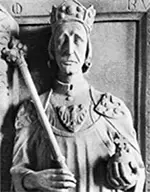Rudolf I: King of Germany
Rudolf I was King of Germany for most of two decades in the latter part of the 13th Century. He was the first king from the House of Habsburg. 
He was born on May 1, 1218, at Limburgh Castle, in what is now the Breisgau region of southwest Germany. His father was Albert IV, Count of Habsburg, and his mother was Hedwig of Kyburg. He grew up at court and, at age 14, went to train as a knight with an uncle, also named Rudolf. As young Rudolf was growing up, the Holy Roman Emperor, Frederick II was involved in a series of conflicts with German princes and with the pope. Frederick found himself excommunicated in 1245. In that same year, Rudolf married Gertrude of Hohenberg. His father had died six years earlier; and the combination of his father's lands and his wife's lands made Rudolf a very powerful noble indeed. He, too, fell afoul of the pope nine years later and joined the Prussian Crusade as a means of penance. Frederick died in 1250, and his son Conrad succeeded him as King of the Romans and King of Sicily. Conrad did not take the imperial throne. He also inherited his father's struggles, both in Germany and in Italy. Conrad died in Italy in 1254, and a long power struggle ensued. The most powerful man to emerge during this time was Richard of Cornwall, son of England's King John. Richard was nominally King of Germany for a time; his death in 1272 provided an opportunity for Rudolf, and he emerged as the strongest among a crowded field, winning election the following year. He was crowned King Rudolf I in Aachen Cathedral on Oct. 24, 1273. Rudolf's wife, Gertrude, died in 1281. They had had 11 children, nine of whom lived into adulthood: Matilda (1253), Albert (1255), Catherine (1256), Agnes (1257), Hedwig (1259), Clementia (1262), Hartmann (1263), Rudolf (1270), and Judith (1271). He married again, to Isabelle of Burgundy; they had no children together. One of Rudolf's prime rivals for the throne had been Ottokar II, King of Bohemia. That king refused to recognize Rudolf's new status as technically his overlord, and Rudolf completed a series of maneuvers including marrying one of his daughters to Ottokar's son as means of smoothing things over; this worked to a degree, but Ottokar was ultimately not satisfied, and the two sides resorted to war. The culmination of this struggle was the Battle on the Marchfeld, on Aug. 26, 1278. Rudolf achieved complete triumph, winning the battle and seeing Ottokar killed in the process. With Ottokar out of the way, Rudolf turned to Austria, to settle things there. He finally found success in 1282, when an imperial diet recognized his son Albert as the duke of Austria and his son Rudolf as the duke of Styria. Thus was ensured Habsburg succession. These successes were minimal overall, however, and Rudolf continued to strive for supremacy. He sought in 1291 to have his oldest son, Albert, crowned King of Germany; the diet refused. Rudolf died that same year, on July 15. By that time, Albert alone of his sons survived. |
|
Social Studies for Kids
copyright 2002–2024
David White




